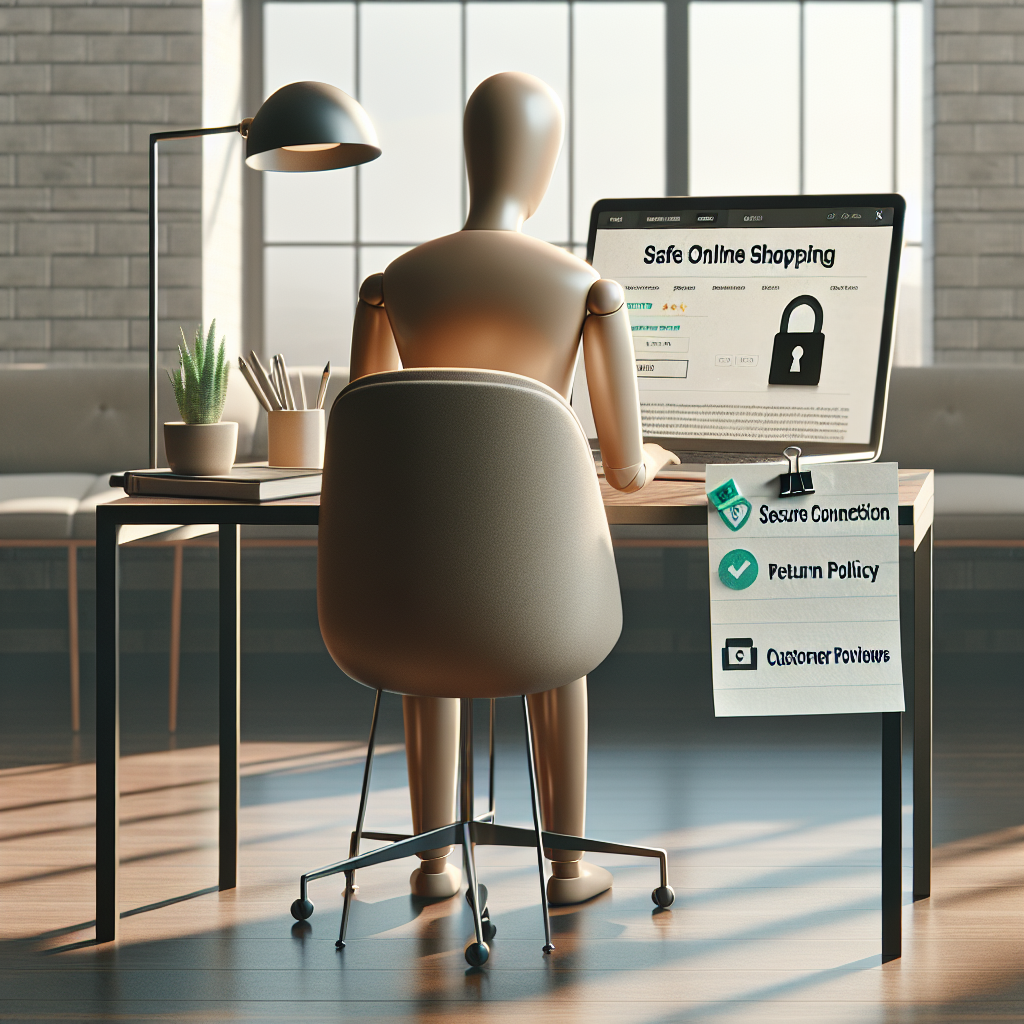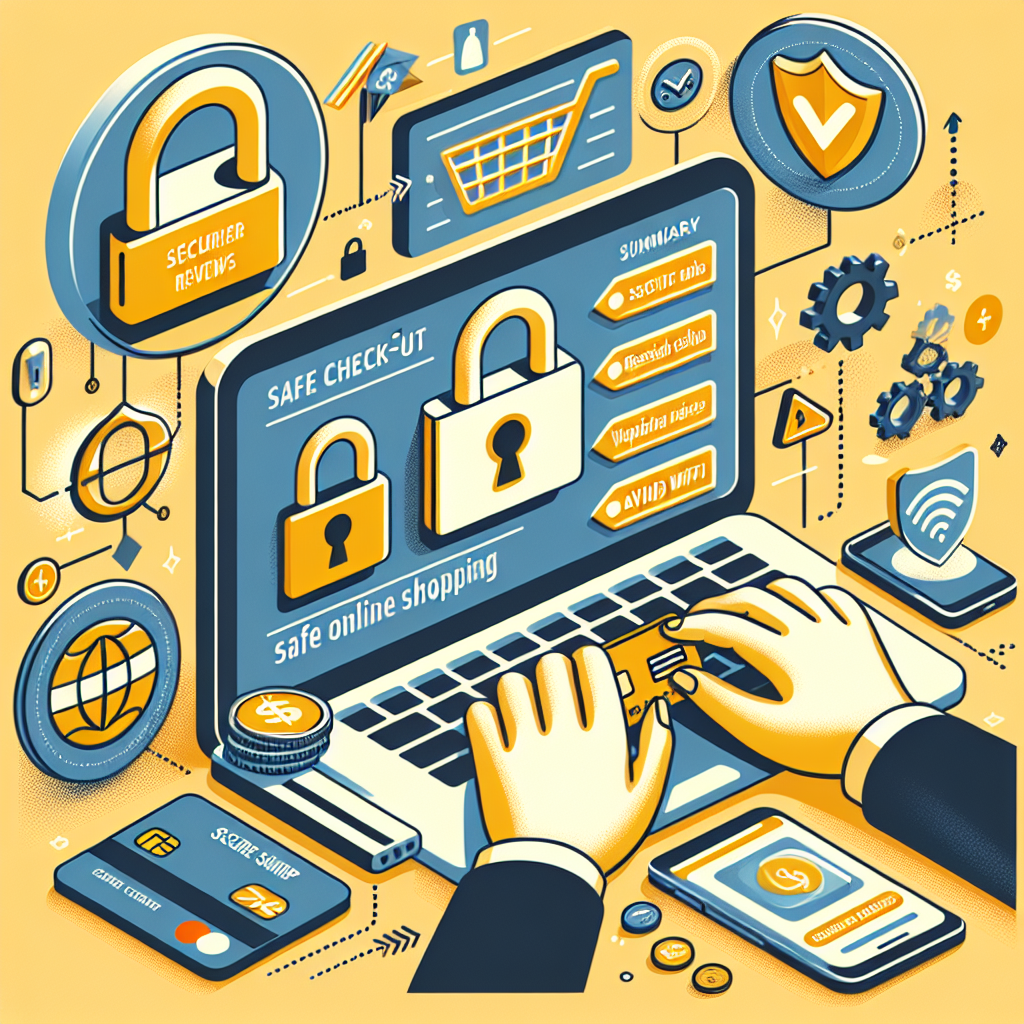In today’s digital age, online shopping has become increasingly popular for its convenience and accessibility. However, with the rise of cyber threats and scams, it’s essential to prioritize safety when making purchases online. To ensure a secure and enjoyable shopping experience, it’s important to follow certain tips and best practices. From choosing reputable websites to safeguarding your personal information, there are simple steps you can take to protect yourself while browsing the virtual aisles. Whether you’re a seasoned online shopper or new to the world of e-commerce, these tips for safe online shopping will help you shop with confidence and peace of mind.
Understanding Online Security Risks

In the modern digital age, it is crucial to have a comprehensive understanding of the various online security risks that can threaten your personal information and financial data. By recognizing the potential dangers, you can take proactive steps to safeguard yourself while engaging in online shopping activities.
Recognizing the importance of online security
- Online security is paramount when conducting transactions or sharing personal details on the internet.
- Cybercriminals are constantly evolving their tactics to exploit vulnerabilities and steal sensitive information.
- Without adequate security measures, individuals are at risk of identity theft, fraud, and unauthorized access to their accounts.
Common threats in the online shopping landscape
- Phishing scams that mimic legitimate websites to trick users into disclosing their login credentials or financial details.
- Malware and viruses that can infect devices and compromise sensitive data stored on them.
- Fake online stores that deceive shoppers into making purchases but never deliver the goods or services.
The significance of secure payment gateways
- Secure payment gateways encrypt payment information to protect it from interception by malicious third parties.
- Look for websites that use trusted payment processors and display secure connection indicators such as HTTPS in the URL.
- Avoid entering sensitive financial information on unsecured websites or public Wi-Fi networks to minimize the risk of data breaches.
Essential Steps Before Making a Purchase
Researching the Website
When engaging in online shopping, it is crucial to conduct thorough research on the website before proceeding with a purchase. This step can help in ensuring that your personal and financial information remains secure. Below are essential details to consider when researching the website:
- Verifying the website’s authenticity:
- Check the URL for any misspellings or unusual characters that may indicate a fraudulent website.
- Look for contact information such as a physical address or phone number to verify the legitimacy of the site.
-
Investigate the website’s About Us section to understand the company’s background and reputation.
-
Checking for SSL encryption:
- Look for the padlock symbol in the address bar, indicating that the website is secure.
- Ensure that the URL begins with “https://” rather than “http://” to confirm the presence of SSL encryption.
-
SSL encryption helps protect your sensitive data during online transactions, making it essential for safe shopping.
-
Reading reviews and ratings for credibility:
- Explore customer reviews and ratings on independent websites or forums to gauge the website’s reputation.
- Pay attention to any recurring complaints about security breaches, poor customer service, or counterfeit products.
- Positive reviews and high ratings from verified customers can instill confidence in the website’s reliability.
Creating Strong Passwords
When it comes to online shopping, creating strong passwords is crucial in safeguarding your personal and financial information from cyber threats. Here are some essential tips to ensure your passwords are robust and secure:
-
Importance of unique and complex passwords: Avoid using easily guessable passwords such as “123456” or “password.” Opt for a combination of uppercase and lowercase letters, numbers, and special characters to create a complex and unique password for each online account.
-
Utilizing password managers for enhanced security: Consider using a reputable password manager to generate and store complex passwords for all your online accounts. Password managers not only help you create strong passwords but also encrypt and securely store them, reducing the risk of unauthorized access.
-
Implementing two-factor authentication: Enable two-factor authentication whenever possible to add an extra layer of security to your online accounts. This additional step typically requires you to enter a unique code sent to your mobile device after entering your password, further reducing the likelihood of unauthorized access to your account.
Secure Payment Methods
When it comes to online shopping, using secure payment methods is crucial to protect your financial information. Here are some essential tips to ensure a safe transaction:
-
Using reputable payment gateways: Opt for well-known and trusted payment gateways such as PayPal, Stripe, or major credit card companies. These platforms offer enhanced security measures and encryption to safeguard your payment details during transactions.
-
Avoiding sharing sensitive information via email: Be cautious of sharing sensitive information like credit card details, passwords, or personal data via email. Scammers often use phishing techniques to steal information, so it’s best to provide such details only on secure websites with HTTPS encryption.
-
Monitoring bank statements for any unauthorized transactions: Regularly monitor your bank statements and credit card transactions for any unauthorized or suspicious activity. Report any discrepancies immediately to your financial institution to prevent further fraudulent charges.

Best Practices During Online Transactions
Secure Wi-Fi Connection
- Importance of using encrypted networks
- When engaging in online shopping, it is crucial to connect to encrypted Wi-Fi networks to safeguard personal and financial information from potential hackers.
-
Encrypted networks provide an additional layer of security by scrambling data transmitted between the device and the router, making it difficult for unauthorized parties to intercept sensitive details.
-
Avoiding public Wi-Fi for sensitive transactions
- Public Wi-Fi networks, such as those in cafes, airports, or hotels, are often unsecured and pose significant risks to online shoppers.
-
Cybercriminals can easily eavesdrop on transactions conducted over public Wi-Fi, potentially capturing credit card details, login credentials, and other confidential information.
-
Ensuring firewall and antivirus protection
- In addition to connecting to secure Wi-Fi networks, it is essential to have robust firewall and antivirus software installed on the device.
- Firewalls help monitor and control incoming and outgoing network traffic, while antivirus programs scan for and remove malware that could compromise the security of online transactions.
Keeping Personal Information Private
Best Practices During Online Transactions
When it comes to online shopping, safeguarding your personal information is crucial to prevent identity theft and fraud. Here are some key strategies to keep your data secure:
-
Limiting the information shared online: Avoid providing unnecessary details when creating accounts or making purchases. Only provide essential information required for the transaction to minimize the risk of exposure.
-
Being cautious of phishing emails and fraudulent websites: Stay vigilant against unsolicited emails requesting personal information or directing you to click on suspicious links. Verify the legitimacy of websites before entering sensitive data to avoid falling victim to scams.

– Understanding the risks of oversharing on social media: Be mindful of the information you share on social networking platforms, as cybercriminals can use these details to orchestrate targeted attacks. Avoid disclosing personal data such as your address, phone number, or birthdate publicly to maintain your privacy and security online.
Post-Purchase Precautions
Reviewing Purchase Confirmations
When it comes to ensuring a safe online shopping experience, reviewing purchase confirmations is a critical step in the process. This stage involves carefully examining the details of your order to confirm its accuracy and legitimacy. By following these specific actions, you can enhance your online security and avoid potential issues down the line:
-
Verifying order details for accuracy: Before finalizing the transaction, meticulously check the item descriptions, quantities, prices, and shipping information in the purchase confirmation. Ensure that everything aligns with what you intended to buy to prevent any fraudulent activity or errors.
-
Saving confirmation emails for reference: It is advisable to retain all purchase confirmation emails in a designated folder within your email account. These emails serve as valuable documentation in case any disputes or discrepancies arise later on. By keeping a record of these communications, you have tangible evidence of your transactions.
-
Contacting customer support for any discrepancies: If you spot any inconsistencies or unauthorized charges in the purchase confirmation, promptly reach out to the retailer’s customer support team. Provide them with specific details about the issue and seek clarification or resolution. Addressing discrepancies immediately can help prevent further complications and protect your financial information.
Monitoring Financial Accounts
Post-Purchase Precautions
Regularly checking bank statements for unusual activity is crucial in ensuring the security of your financial information. By reviewing your statements on a frequent basis, you can quickly identify any unauthorized charges or suspicious transactions. This proactive approach allows you to take immediate action if any fraudulent activity is detected, minimizing the potential impact on your finances.
Reporting any unauthorized charges immediately is essential to protecting your funds and resolving any issues in a timely manner. Contacting your bank or credit card issuer as soon as you notice any unfamiliar or unauthorized transactions can help prevent further unauthorized activity and ensure that you are not held liable for any fraudulent charges.
Setting up transaction alerts for added security is a proactive measure that can provide an extra layer of protection for your financial accounts. By enabling notifications for transactions over a certain amount or for any activity outside of your normal spending patterns, you can quickly spot any red flags and address them promptly. These alerts can help you stay informed about your account activity and detect any potential fraud before it escalates.
Educating Yourself on Online Security
Staying Informed on Latest Threats
Staying informed on the latest threats in online shopping is crucial to safeguarding your personal and financial information. By keeping up-to-date on emerging risks, you can better protect yourself from falling victim to cybercriminals. Here are some effective strategies to stay informed:
-
Following reputable cybersecurity sources: Regularly checking trusted cybersecurity websites, blogs, and forums can provide valuable insights into current online threats. Organizations like the Cybersecurity and Infrastructure Security Agency (CISA) and the Electronic Frontier Foundation (EFF) often publish alerts and updates on new scams and vulnerabilities.
-
Learning about common scams and fraud tactics: Understanding how cybercriminals operate can help you recognize warning signs and avoid potential traps. Familiarize yourself with common tactics such as phishing emails, fake websites, and identity theft schemes. Online resources like the Federal Trade Commission (FTC) and the Better Business Bureau (BBB) offer detailed information on prevalent scams.
-
Participating in online security awareness programs: Many institutions and cybersecurity companies offer online security awareness programs that cover a wide range of topics, including safe online shopping practices. These programs often include interactive modules, webinars, and resources to educate consumers on the latest threats and how to protect themselves effectively. Regularly participating in such programs can enhance your knowledge and awareness of online security best practices.
Seeking Professional Advice
When it comes to ensuring your online shopping experience is secure, seeking professional advice can be invaluable. Cybersecurity experts have the knowledge and expertise to provide personalized tips tailored to your specific online habits and preferences. By consulting with these professionals, you can gain insights into the latest online threats and best practices for protecting your sensitive information. Additionally, cybersecurity experts can conduct security audits of your online shopping habits to identify any potential vulnerabilities and recommend strategies to mitigate risks.
Investing in cybersecurity tools is another recommendation that professionals often suggest. These tools can provide added layers of protection, such as antivirus software, firewalls, and secure browsing extensions. By incorporating these tools into your online shopping routine, you can enhance your overall security posture and reduce the likelihood of falling victim to cyber threats.
In conclusion, seeking professional advice from cybersecurity experts can help you stay informed about online security best practices, identify potential vulnerabilities in your online shopping habits, and implement effective strategies to protect your personal and financial information while shopping online.
FAQs: Tips for Safe Online Shopping
What are some tips for staying safe while shopping online?
When shopping online, it is important to always make sure you are using a secure and trustworthy website. Look for ‘https’ in the URL and a padlock symbol in the address bar. Never shop on public Wi-Fi networks, as they are not secure. Avoid clicking on suspicious links or pop-up ads, and always use strong, unique passwords for your accounts. Regularly monitor your bank statements and credit card activity for any unauthorized charges.
How can I ensure that my personal information is secure when shopping online?
To keep your personal information safe, only provide necessary details when making a purchase. Avoid giving out your social security number or other sensitive data unless absolutely required. Use a secure payment method such as credit cards or third-party services like PayPal, which offer buyer protection. Be wary of sharing too much information on social media and always check the privacy settings of the websites you use.
Are there any red flags to watch out for when shopping online?
Be cautious of deals that seem too good to be true, as they may be scams. Look out for websites with poor design, spelling errors, or lack of contact information, as these are common indicators of fraudulent sites. Avoid clicking on unsolicited emails or messages from unknown sources, as they may contain malware or phishing attempts. Trust your instincts and if something feels off, it’s best to err on the side of caution.


